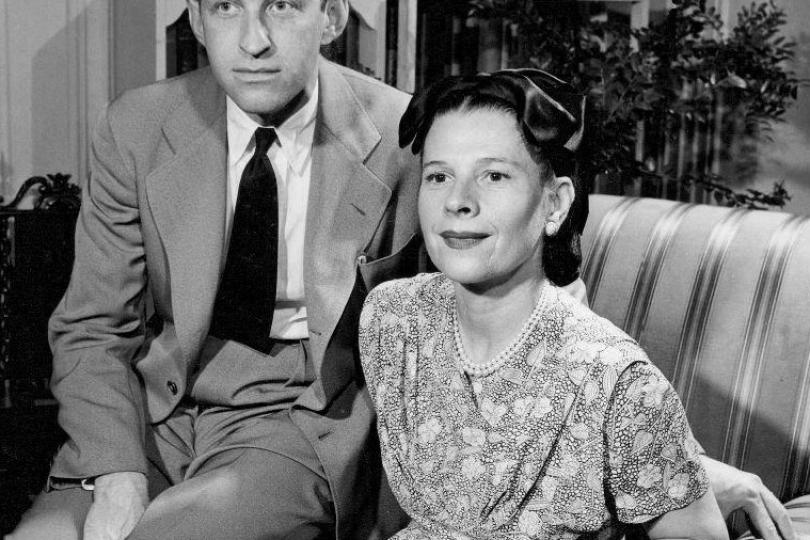Ruth Gordon, Garson Kanin and Marian Seldes

Theater creates strange bedfellows, and while this trio weren’t really that strange, their lives and creative output were singular.
Ruth Gordon
Ruth Gordon Jones (1896-1985) had a philosophy that remains valuable. She felt that people owe it to humanity to be interesting, and she certainly was that, and more: actress, screenwriter and playwright, her career lasted almost 7 decades. A Massachusetts girl, her father was a factory foreman who has been a ship’s captain. His plans for her included a career as a Phys. Ed. Teacher. But Ruth had other ideas. She wanted to be an actress.
Enrolled at the American Academy of Dramatic Arts, within a year, she had extra work in silent films, but when she was cast as Nibs, one of the lost boys in the Maude Adams company of Peter Pan everything changed. After Woollcott reviewed the production, commenting that Gordon was “ever so gay as Nibs,” she wrote a thank you letter to him and the two became lifelong friends.
Following her Broadway success as Lola Pratt, the baby-talk lady in Booth Tarkington’s Seventeen, Gordon spent these early years building her resume. She relates a delightful story in her book, My Side, of a tour of Fair and Warmer, when the ensemble played Eau Claire, WI. When the show moved on to other locales, a policeman traveled with them, because the leading man had made a pass at a banker’s son, and they were literally ridden out of town on a rail!
Gregory Kelly and Jed Harris
Wanting to be stylish, in 1920, while in Chicago, she had her legs broken to fix being bow-legged. She married actor Gregory Kelly, but it only lasted seven years because Kelly died of heart disease, making Gordon a widow. When she became involved with producer Jed Harris, they had a son, Jones Harris. It was during this time that her resume grew. Ethan Frome, The Country Wife and A Doll’s House sealed her reputation as a respected actress.
Signed to a film contract, she appeared in Action in the North Pacific; as Mary Todd in Abe Lincoln in Illinois and as Edward G. Robinson’s wife in Dr. Ehrlich’s Magic Bullet. She also played Greta Garbo’s secretary in the beautiful star’s last movie, Two-Faced Woman. Gordon (as mentioned previously) appeared in Three Sisters with Kit Cornell, but something new was about to happen.
The Playwright emerges
Gordon next played roles she wrote for herself. In Over Twenty-One she played a novelist who follows when her husband, a reporter, enlists during World War II. The Leading Lady chronicled her touring years, and Years Ago told the story of her desire to become an actress. It was later filmed, using Gordon’s screenplay, as The Actress with Spencer Tracy and Jean Simmons.
Love and Marriage
In 1942, Ruth Gordon met and married writer and director Garson Kanin (1912-1999). He was sixteen years younger, and like the husband in Over Twenty-One, Kanin served in the Army. Another graduate of the AADA, his first important project was directing Spencer Tracy in Robert Sherwood’s The Rugged Path. It wasn’t a positive experience, but Kanin and Tracy became lifelong friends. Gordon and Kanin co-wrote the screenplay for A Double Life, earning an Oscar for Ronald Colman. When Spencer Tracy teamed with Katharine Hepburn for a series of successful movies, two of their best, Adam’s Rib and Pat and Mike were written for them by Gordon and Kanin.
Born Yesterday and The Matchmaker
Before it’s Broadway opening, Jean Arthur walked away from Born Yesterday. Judy Holliday took over, playing Billie Dawn for its entire Broadway run and repeating her performance on film, winning an Oscar. This helped make the 1950s a productive time for the Kanins. He directed the original production of The Diary of Anne Frank, and began writing novels, among them, Mr. Broadway, The Rat Race and Do Re Mi, (which was later adapted for the stage and screen). Gordon was cast in the role of a lifetime: Dolly Gallagher Levi in Thornton Wilder’s The Matchmaker, directed by Tyrone Guthrie. She played Dolly on Broadway, on the road, and in Europe. Kanin went on to direct Barbra Streisand in Funny Girl. He wrote a new libretto and directed Die Fledermaus, at the Metropolitan Opera.
Following Tracy’s death in 1967, Kanin published Tracy and Hepburn: An Intimate Memoir. His neighbor, Katharine Hepburn, was so upset with him that the Kanins sold their 49th Street townhouse to Stephen Sondheim.
The movies and television rediscovered Gordon in the 1960s. She won a Golden Globe for her role as Natalie Wood’s crazy mother in Inside Daisy; headed an all-star cast as Madame Arcati in a television production of Blithe Spirit, and in 1969, she won an Oscar for in Rosemary’s Baby. When she accepted her award, she stated that she didn’t know why it took so long, but how encouraging it was. Shortly thereafter, she published her first auto-biography, Myself Among Others. Then Hal Ashby and Colin Higgins came calling.
A Cult Movie
They wanted Ruth Gordon to play Maude, a life-loving woman who befriends Harold, a death-obsessed young man played by Bud Cort in the delightful cult film, Harold and Maude. At first ignored (I first saw it on a double bill with Play It Again, Sam), eventually it became a cult classic, playing, for example, three years at a now-closed cinema in Edina.
Gordon’s last Broadway appearance was as the title character opposite Lynn Redgrave in Shaw’s Mrs. Warren’s Profession at Lincoln Center. She then wrote two more autobiographical works, My Side and An Open Book, as well as the enchanting novel, Shady Lady, about a young lady who becomes a Ziegfeld girl, supposedly based on a woman from Minnesota.
Among her later films are Clint Eastwood’s Every Which Way but Loose and Any Which Way You Can; Maxie and My Bodyguard, as well as roles on Rhoda, Newhart and hosting Saturday Night Live.
Ruth Gordon died following a stroke at the age of 88, in August 1985. A theater in Quincy, MS has been named for her.
Life after Ruth Gordon
Garson Kanin continued to work following his wife’s death. Three sections of his novel, Moviola: The Silent Lovers, about Greta Garbo and John Gilbert; This Year’s Blonde about Marilyn Monroe and The Scarlett O’Hara Wars, about casting Gone with the Wind, were filmed for television. His novel Smash, about the process of writing a musical, became a TV series, and his last play, Peccadillo, in 1985. He has been inducted into the American Theater Hall of Fame.
Kanin and Seldes
Five years after Gordon’s death, Garson Kanin married actress Marian Seldes (1928-2014), whose career spanned over 60 years. Trained for the stage (she studied with Sanford Meisner, Kit Cornell and Martha Graham), she made her debut opposite Dame Judith Anderson in the 1948 revival of Medea. A five-time Tony nominee, she won for the original production of Albee’s A Delicate Balance. She appeared as the author’s wife in Ira Levin’s Deathtrap, and during the long run, she spent her time offstage writing both a novel, Time Together, and her autobiography, Bright Lights.
Among her stage roles were Ring Round the Moon, Equus and Terence McNally’s Deuce (opposite Angela Lansbury). She also worked in films and such TV series as Murphy Brown and Sex and the City.
Acting Style
Seldes’ acting style was relaxed and understated, but there were times when her style didn’t work. In 1996, for example, she replaced an ailing Dorothy Loudon as actress Carlotta Vance in Lincoln Center revival of Dinner at Eight. The character is brassy, but a miscast Seldes played her as a classy lady instead. One of her last roles was as Big’s mother on an episode of Sex and the City.
Seldes taught theater at Julliard, and among her students were Christopher Reeve, Robin Williams, Kelsey Grammer, Kevin Kline, William Hurt, Val Kilmer and Kevin Spacey.
Marian Seldes was inducted into the American Theater Hall of Fame in 1995. Garson Kanin passed away in 1999, at the age of 86. Seldes was honored with a Lifetime Tony in 2010. She passed away in 2014 at the age of 86.
Acting and writing Screenplays, novels, plays and autobiographies that win Oscars, Tony Awards and more are respectful legacies for these three important icons of 20th Century Theater.




